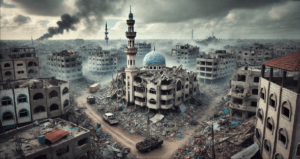Palestinian Journalist Anas Baba Returns Home After 15 Months of War and Displacement
Palestinian journalist Anas Baba has returned to Gaza City after 15 months of displacement. He is one of the few Palestinian reporters working for an American news outlet, NPR. Since the war began, Israel has restricted international journalists from entering Gaza. The conflict started on October 7, 2023, when Hamas attacked Israel, leading to Israeli airstrikes. Over 48,000 people, mostly women and children, have been killed, and 90% of homes are damaged or destroyed.
Baba continued reporting under dangerous conditions, documenting the war’s toll. Israel’s attacks have resulted in record journalist deaths. Using just his phone, Baba provided firsthand reports from hospitals and refugee camps. A ceasefire took effect on January 19, 2025. A week later, displaced Palestinians, including Baba, were allowed to return. Gaza City is now in ruins, with entire neighborhoods destroyed. Baba’s story is featured on NPR’s Up First podcast.

Palestinian Journalist Anas Baba Returns Home After 15 Months of War and Displacement
After spending 15 months away, Palestinian journalist Anas Baba has finally returned to Gaza City. Baba is among the few Palestinian reporters working full-time for an American news organization, NPR, while based in Gaza. Since the onset of the war, Israel has prohibited independent entry for international journalists. However, being a native of Gaza, Baba chose to remain and provide firsthand reports on the conflict. His journalism has offered critical insights into the humanitarian crisis and destruction resulting from the war.
The conflict began on October 7, 2023, when Hamas launched an attack on Israel, resulting in nearly 1,200 deaths and 251 hostages. In retaliation, Israel initiated airstrikes on Gaza. According to the Gaza Health Ministry, the death toll has surpassed 48,000, with more than half being women and children. The destruction has been immense, with over 90% of homes either damaged or completely leveled. Many residents now seek refuge in makeshift shelters, such as tents or overcrowded school facilities, where access to electricity and clean water is severely limited. The worsening humanitarian crisis has led to shortages of medical supplies, food, and safe living conditions.
Despite these extreme dangers, Baba has continued his reporting. He has covered the war’s effects while constantly facing risks. The Committee to Protect Journalists has stated that this war has resulted in the highest number of journalist deaths ever recorded. Despite the threats, Baba has relied on his phone to deliver firsthand reports from hospitals, refugee camps, and bombing sites. His journalism has been instrumental in informing NPR’s audience about the realities on the ground, shedding light on the struggles of ordinary Palestinians and their resilience amid devastation.
On January 19, 2025, a ceasefire between Israel and Hamas took effect. Around a week later, displaced individuals were permitted to return north, including Baba. Upon reaching his home in Gaza City, he found it nearly unrecognizable. Entire neighborhoods had been demolished, and even familiar landmarks, such as his local mosque, had suffered severe damage. The widespread destruction stands as a stark reminder of the war’s toll, as families return to ruins rather than homes.
Baba’s story and further coverage of the war can be found on NPR’s Up First podcast. His reporting has played a crucial role in revealing the grim realities of life in Gaza during the conflict. Despite facing life-threatening conditions, Baba remains committed to amplifying the voices of those affected, ensuring their experiences are heard worldwide. His dedication to journalism has made him a vital source of information, bringing global attention to the ongoing humanitarian crisis. Through his fearless reporting, he sheds light on the struggles of displaced families, the destruction of homes, and the urgent need for humanitarian aid in Gaza.
You must be logged in to post a comment.